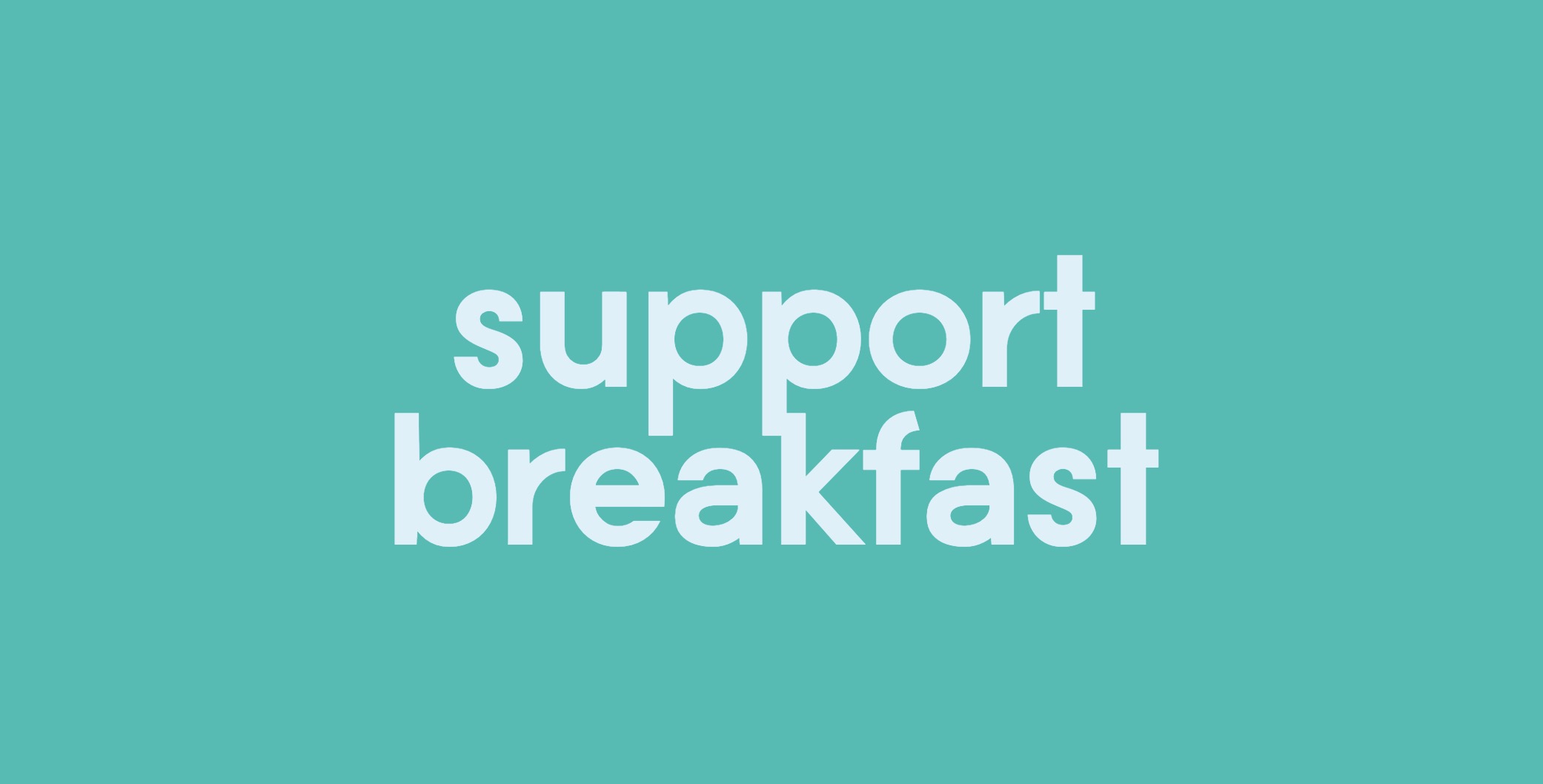Recipes and Cooking Tips
Is Oatmeal a Healthy Breakfast? Here’s Why It’s a Top Choice!
The surprising benefits of oatmeal might just make it your new favorite breakfast choice—discover why it stands out among healthy options!
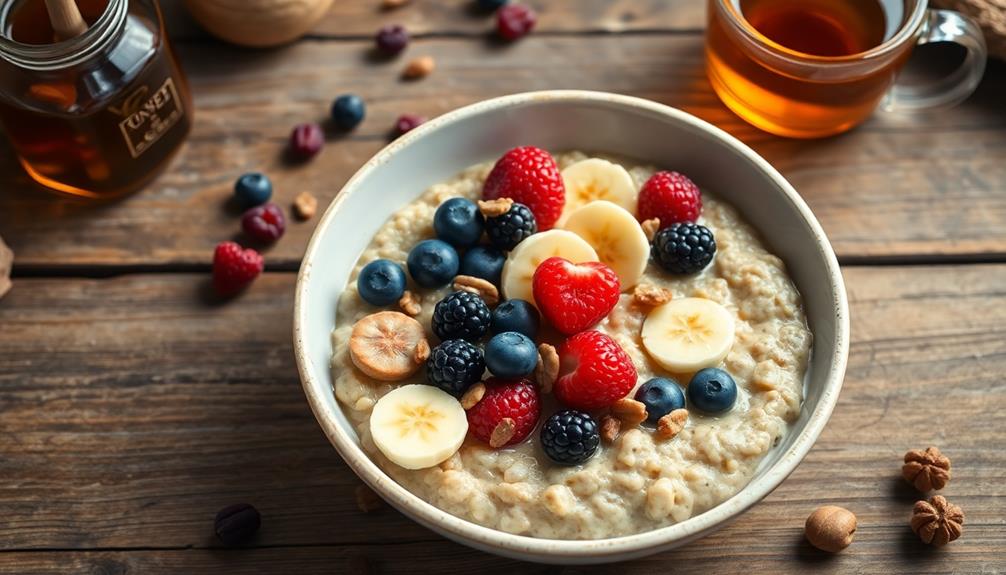
Yes, oatmeal is an incredibly healthy breakfast choice! Packed with nutrients, it offers a solid dose of fiber and protein that keeps you full and satisfied. The soluble fiber in oats can help lower cholesterol and stabilize blood sugar levels. Plus, oatmeal supports digestion and promotes gut health. Low in calories but high in vitamins and minerals, it's a filling option that can aid in weight management. Whether you enjoy it with fruits or spices, oatmeal's versatility makes it easy to incorporate into your diet. Discovering more about its preparation and benefits can enhance your breakfast routine!
Key Takeaways
- Oatmeal is rich in fiber and protein, promoting satiety and aiding in weight management.
- The soluble fiber in oats helps lower cholesterol levels and supports heart health.
- Oatmeal stabilizes blood sugar levels due to its low glycemic index and beta-glucan content.
- Regular consumption of oats improves digestive health and promotes a healthy gut microbiome.
- Oats are versatile and can be easily customized with fruits, nuts, and spices for added nutrition.
Nutritional Profile of Oats
Oats offer a remarkable nutritional profile that makes them a standout choice for breakfast. As a whole grain food, oats provide impressive nutritional value that supports a healthy diet. Each serving delivers about 4 grams of fiber and 5 grams of protein while remaining low in calories, making them a filling option without excess calories.
What sets oats apart is their high content of soluble fiber, particularly beta-glucan, which plays a crucial role in maintaining heart health. Additionally, oats pack a punch with essential vitamins and minerals, supplying 64% of the recommended daily allowance for manganese and 18% for copper per serving.
You'll also benefit from the antioxidant compounds like avenanthramides found in oats, which help reduce oxidative stress and promote blood flow. This means you're not just getting fiber and protein, but a range of nutrients that contribute to overall wellness.
Plus, the versatility of oats can't be overstated; whether you prefer rolled, steel-cut, or instant oats, you can easily adapt them to fit your taste and dietary needs. Enjoying oats at breakfast sets a strong foundation for your day!
Health Benefits of Oatmeal

When you choose oatmeal for breakfast, you're not just enjoying a tasty meal; you're also fueling your body with a nutrient-dense composition that supports heart health and regulates blood sugar.
With its rich fiber content, oatmeal can help lower cholesterol levels and keep you feeling full longer.
Plus, its ability to stabilize glucose absorption makes it a smart choice if you're watching your blood sugar.
Nutrient-Dense Composition
A warm bowl of oatmeal serves as a powerhouse of nutrition, packed with essential nutrients that contribute to your overall well-being. One of the standout features of oatmeal is its rich content of dietary fiber, providing about 4 grams per serving. This fiber promotes fullness and supports your digestive health, making oatmeal a smart choice for breakfast.
In addition to fiber, oatmeal offers significant nutrients that boost your health:
| Nutrient | Daily Value (%) |
|---|---|
| Manganese | 64% |
| Copper | 18% |
| Vitamin B1 | 16% |
The soluble fiber, beta-glucan, plays an important role in lowering total and LDL cholesterol levels, enhancing the health benefits of oatmeal. Its low glycemic index helps stabilize blood sugar levels, making it particularly beneficial for those with type 2 diabetes. Furthermore, regular consumption of oatmeal can improve gut health due to its prebiotic properties, which encourage the growth of beneficial gut bacteria. By incorporating oatmeal into your diet, you're not just enjoying a delicious meal; you're also reaping a multitude of health benefits.
Heart Health Support
For anyone looking to support heart health, oatmeal is a standout choice. Packed with soluble fiber, especially beta-glucan, oatmeal plays an essential role in lowering total and LDL (bad) cholesterol levels. By incorporating oatmeal into your daily routine, you could see a reduction in your cholesterol by up to 10% within just six weeks. This is a significant benefit for anyone aiming to reduce their risk of heart disease.
Additionally, the antioxidants found in oats, like avenanthramides, enhance blood flow and help reduce oxidative stress, further promoting cardiovascular health. Regular consumption of oats not only aids in managing cholesterol but also supports overall heart health, particularly for those with diabetes or prediabetes.
A diet rich in whole grains, including oatmeal, is associated with a lower risk of coronary heart disease.
Blood Sugar Regulation
How does oatmeal help with blood sugar regulation? Oatmeal is rich in beta-glucan, a type of soluble fiber that slows down glucose absorption in your body. This means you can reduce those post-meal blood sugar spikes that often leave you feeling sluggish.
Regularly eating oatmeal can greatly lower insulin levels, which is particularly beneficial if you're managing Type 2 diabetes.
Moreover, studies show that incorporating oats into your diet can improve insulin sensitivity. When your body responds better to insulin, it helps you maintain stable blood sugar levels throughout the day.
Oatmeal also boasts a lower glycemic index, making it a smart choice for your breakfast.
The fiber in oats not only aids in blood sugar regulation but also promotes the growth of beneficial gut bacteria, enhancing your overall metabolic health.
By choosing oatmeal for breakfast, you're setting a foundation for better blood sugar control and a healthier lifestyle.
How Oats Aid Digestion

Oats are packed with fiber, which can greatly improve your digestion.
This high fiber content not only helps alleviate constipation but also promotes a healthy gut by nourishing beneficial bacteria.
High Fiber Content
When it comes to breakfast choices, oatmeal stands out thanks to its impressive high fiber content, which plays a crucial role in digestion.
With about 4 grams of dietary fiber per serving, oats help improve digestive health by promoting regular bowel movements. The soluble fiber, particularly beta-glucan, not only aids in alleviating constipation but also contributes to lowering cholesterol levels, which is essential for overall heart health.
The high fiber content in oats adds bulk to your stool, enhancing gut motility and making it easier to pass. This is especially beneficial if you struggle with digestive issues, as oats can help prevent constipation and support a healthy digestive system.
Studies have even shown that oat bran can be effective for individuals with conditions like ulcerative colitis, providing relief and promoting regularity.
Promotes Gut Health
A hearty bowl of oatmeal not only fills you up but also plays a significant role in promoting gut health. Packed with dietary fiber, oats provide about 4 grams per serving, which helps you maintain regular bowel movements and supports overall digestive health. The soluble fiber known as beta-glucan in oats not only enhances satiety but also delays gastric emptying, making digestion more efficient.
| Benefits of Oats | How it Affects Gut Health | Key Component |
|---|---|---|
| Promotes beneficial bacteria | Supports a healthy microbiome | Soluble fiber |
| Improves gut motility | Aids in regular bowel movements | Dietary fiber |
| Helps prevent digestive disorders | Alleviates symptoms like ulcerative colitis | Oat bran |
Alleviates Constipation Symptoms
Alleviating constipation symptoms is one of the standout benefits of including oats in your diet. When you incorporate oats, you're not just enjoying a tasty breakfast; you're also actively promoting better digestive health.
Oats are rich in soluble fiber, particularly beta-glucan, which helps retain water in your intestines, making your stool easier to pass. This prevents hardening and ultimately alleviates constipation.
Here are three ways oats can help your digestion:
- High Fiber Content: Oats contain about 4 grams of fiber per serving, encouraging regular bowel movements and easing constipation.
- Oat Bran Benefits: Oat bran, a specific part of the oat, boasts a higher concentration of fiber that markedly aids digestion and prevents constipation.
- Gut Health Improvement: Regularly consuming oats supports the growth of beneficial gut bacteria, enhancing overall gut health and comfort.
Oatmeal and Weight Management
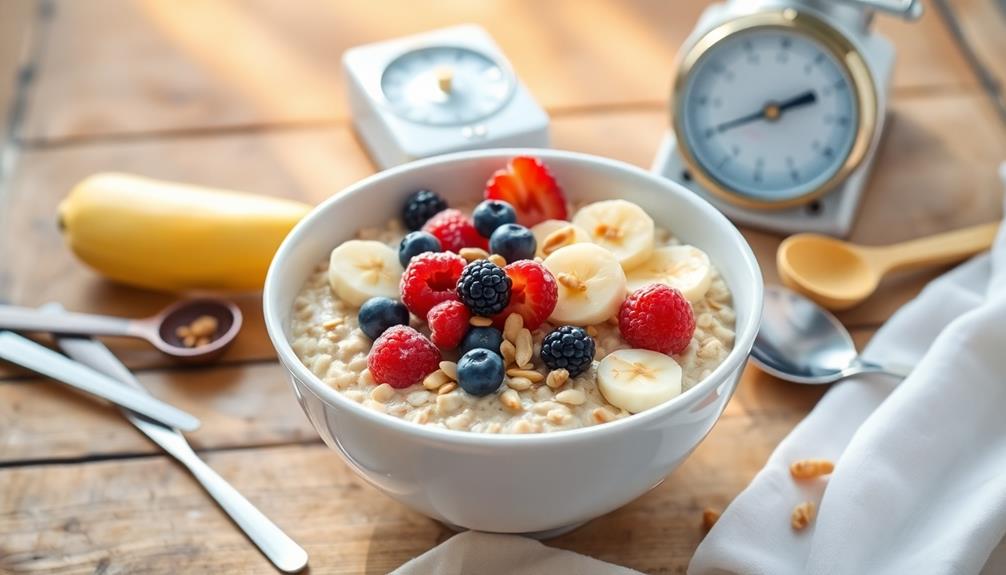
Oatmeal can be a powerful ally in your weight management journey. Its high fiber content, especially from beta-glucan, promotes satiety, helping you feel full for longer. This can lead to a reduction in overall calorie intake, making oatmeal an excellent choice for weight loss.
When you start your day with oatmeal for breakfast, you're not just fueling your body; you're also setting yourself up for healthier eating patterns throughout the day.
Studies show that regular consumption of oatmeal is linked to lower body weight, reduced body mass index (BMI), and decreased body fat. The soluble fiber in oats slows gastric emptying, which enhances feelings of fullness and stimulates the release of the satiety hormone peptide YY (PYY).
This means that by choosing oatmeal as your breakfast option, you're likely to avoid higher-calorie foods later on, supporting your weight management goals.
Moreover, oatmeal's versatility allows you to customize it with various toppings like fruits or nuts, keeping your meals exciting while still being nutritious.
Impact on Blood Sugar Levels
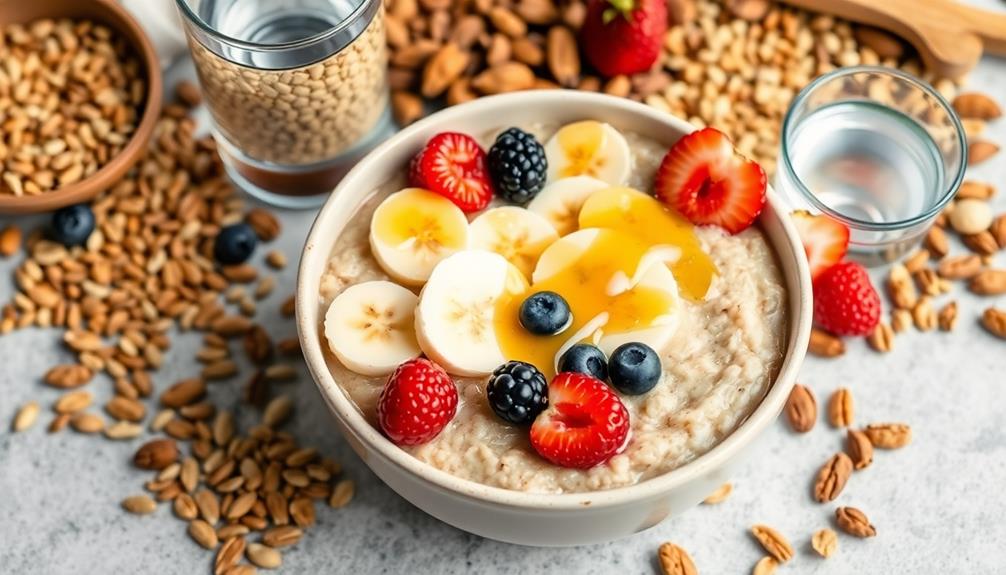
When you choose oatmeal for breakfast, you're not just getting a tasty meal; you're also helping to stabilize your blood sugar levels.
Oats contain beta-glucan, a fiber that slows glucose absorption and can improve your body's insulin sensitivity. This means you're likely to experience better glycemic control, especially if you're managing conditions like prediabetes or Type 2 diabetes.
Blood Sugar Control
A healthy breakfast can greatly impact your blood sugar levels, and oatmeal stands out as a particularly beneficial choice. Oatmeal is rich in beta-glucan, a type of soluble fiber that slows the absorption of glucose, helping to reduce those pesky post-meal spikes in blood glucose. This can be especially helpful if you're managing diabetes or prediabetes.
Here are three reasons why oatmeal is great for blood sugar control:
- Improved Insulin Sensitivity: Regularly consuming oats can enhance your body's ability to respond to insulin, which is essential for maintaining balanced blood sugar levels.
- Lower Blood Insulin Levels: Studies show that oat beta-glucan can lower blood insulin levels, further supporting your glycemic control.
- Enhanced Satiety: The fiber content in oatmeal keeps you feeling full longer, which helps prevent overeating and stabilizes blood sugar levels throughout the day.
Incorporating oatmeal into your breakfast routine can also support cardiovascular health by lowering total and LDL cholesterol, indirectly benefiting your blood sugar regulation.
Glycemic Response Improvement
In the morning, starting your day with oatmeal can greatly improve your glycemic response, making it a smart choice for managing blood sugar levels. Oatmeal's soluble fiber, particularly beta-glucan, effectively slows the absorption of glucose, stabilizing your blood sugar after meals. If you're looking to reduce postprandial blood glucose spikes, oatmeal is especially beneficial, particularly for those with diabetes or prediabetes.
Regularly enjoying oatmeal can enhance insulin sensitivity, a key factor in managing blood sugar levels. Systematic reviews highlight that oat beta-glucan can markedly lower blood insulin levels, contributing to better metabolic health. Plus, with a low glycemic index, oats produce a slower rise in blood sugar compared to many breakfast options, ensuring sustained energy and satiety throughout the morning.
| Benefit | Impact on Health | Emotional Response |
|---|---|---|
| Lowers Blood Sugar | Stabilizes glucose levels | Peace of mind |
| Improves Insulin Sensitivity | Enhances metabolic health | Empowerment |
| Reduces Cholesterol | Supports heart health | Confidence |
| Maintains Satiety | Prevents cravings | Comfort |
Choosing oatmeal isn't just a healthy breakfast; it's a step towards better blood sugar management!
Oats for Skin Health
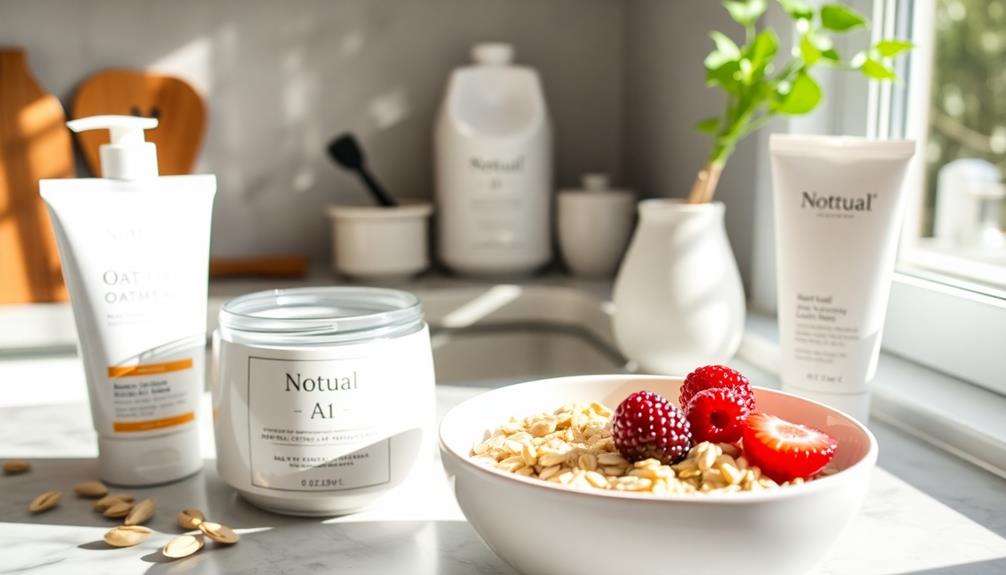
Oats offer remarkable benefits for skin health, making them a valuable addition to your skincare routine. Packed with antioxidants and anti-inflammatory effects, oats can effectively soothe irritation and inflammation, helping conditions like eczema and atopic dermatitis.
You'll appreciate how incorporating oats into your regimen can improve your skin's overall appearance while maintaining moisture.
Here are three key benefits of using oats for skin health:
- Soothing Properties: Colloidal oatmeal forms a protective barrier on the skin, relieving itching and irritation often associated with various skin conditions.
- Anti-Inflammatory Effects: The avenanthramides found in oats work wonders in reducing inflammation, perfect for alleviating dry and irritated skin.
- Natural Barrier Support: Regular use of oatmeal helps support your skin's natural barrier, shielding it against environmental stressors while enhancing hydration.
Versatile Oatmeal Recipes
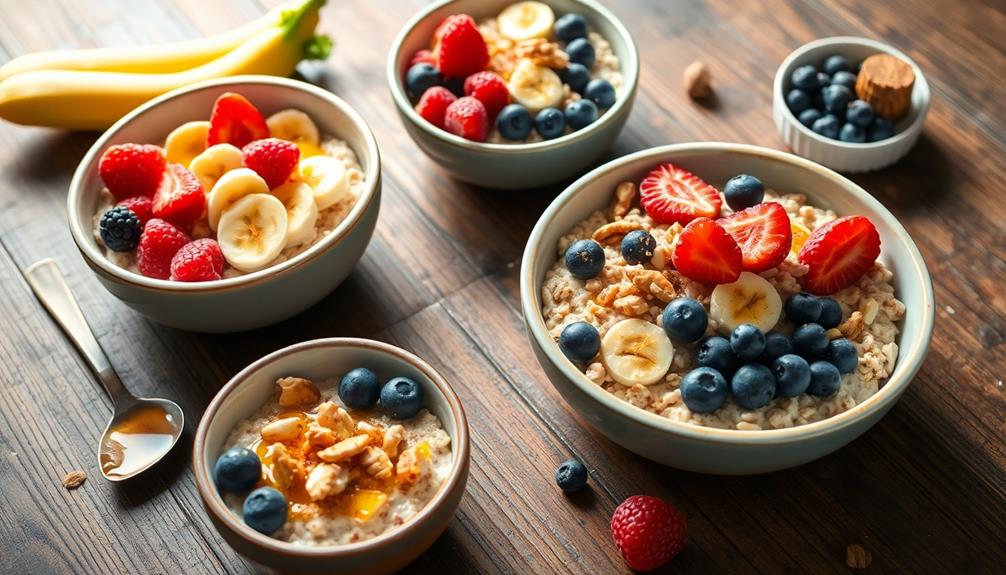
Discovering the numerous health benefits of oats for your skin might spark your interest in incorporating them into your meals, especially breakfast.
Oatmeal's versatility shines through with various recipes to suit your taste and schedule. One popular option is overnight oats. Simply soak rolled oats in milk or yogurt the night before, and you'll enjoy a quick, nutritious breakfast customized with fruits, nuts, or your favorite spices.
If you prefer a heartier texture, try steel-cut oats. Their chewier consistency makes them perfect for slow cooker recipes, where they can simmer overnight, providing you with a warm, satisfying meal in the morning.
For those busy mornings, quick-cooking oats are your best friend. They cook in just a couple of minutes in the microwave, allowing you to maintain a nutritious breakfast routine without sacrificing time.
Don't forget to add spices like cinnamon or nutmeg to your oatmeal; they enhance flavor and offer anti-inflammatory benefits.
Oats can also be creatively incorporated into smoothies, pancakes, or even as a binding agent in meatloaf, showcasing their true versatility in various meals.
Enjoy experimenting with these versatile oatmeal recipes!
Common Misunderstandings About Oats

Often, people hold onto misconceptions about oats that can lead to a misunderstanding of their health benefits. While it's true that some instant and flavored varieties contain added sugars, plain oats are nutrient-dense and one of the healthiest foods you can include in your diet.
Here are some common misunderstandings:
- Oatmeal is just for breakfast: Oats are incredibly versatile. You can add them to smoothies, use them in baked goods, or even incorporate them into savory dishes throughout the day.
- All oatmeal is the same: Instant oatmeal often has processed oats with artificial ingredients and higher sugar levels, which diminish their health benefits. Opt for whole grain oats for the most nutrients.
- Oatmeal isn't good for weight management: In reality, oats are high in fiber, promoting satiety and helping you control your appetite. This can lead to reduced overall calorie intake.
Don't let these misconceptions stop you from enjoying oats! When prepared correctly, they can be a delicious part of a healthy diet, even for those with gluten sensitivities, as certified gluten-free oats are available.
Healthy Preparation Tips

When it comes to making oatmeal a healthy breakfast option, preparation is key. Start by choosing minimally processed oats like steel-cut or rolled oats. These options maximize nutritional benefits and fiber content, providing you with a hearty start to your day.
To keep calorie counts lower, cook your oatmeal with water instead of milk. This helps maintain hydration without adding unnecessary calories. Avoid flavored instant varieties; opt for plain, unsweetened oatmeal to steer clear of excessive added sugars that can negate health benefits.
Incorporating nutritious toppings is another great way to enhance your meal. Fresh fruits, nuts, or seeds not only boost the flavor but also increase the nutrient profile without added sugars.
Lastly, pay attention to portion sizes. A typical serving size is about half a cup of dry oats, which provides a balanced amount of fiber and energy to keep you satisfied throughout the morning.
Expert Insights on Oats
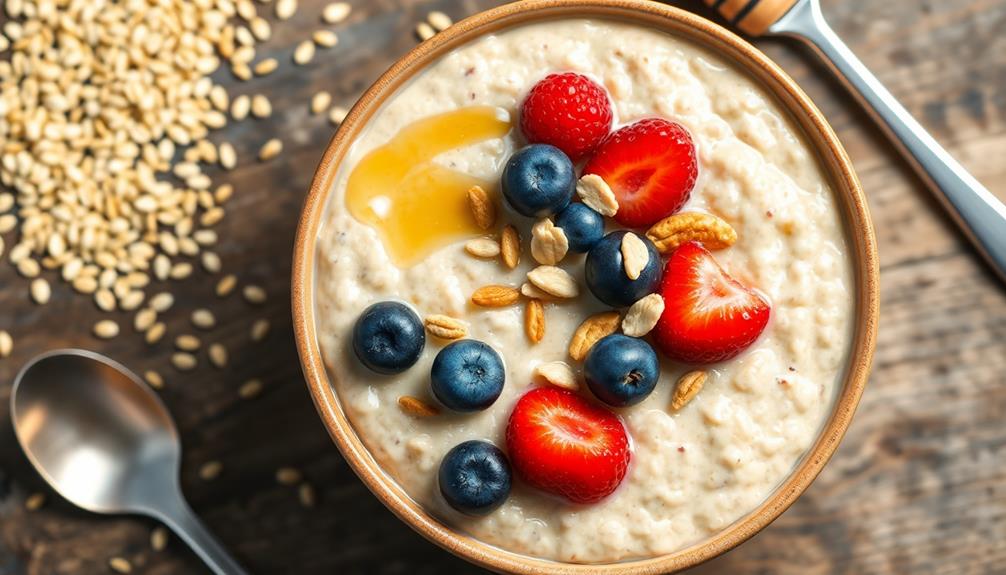
Nutrition experts consistently highlight oats as a powerhouse of health benefits, particularly for their fiber content. The soluble fiber found in oats, specifically beta-glucan, plays an essential role in lowering cholesterol levels and promoting heart health.
When you include oats in your diet, you're not just enjoying a tasty breakfast; you're also taking a proactive step towards reducing your risk of chronic diseases like heart disease and type 2 diabetes.
Here are three key insights from nutrition experts about oats:
- Moderation is Key: Be mindful of added sugars and fats. Edward Giovannucci emphasizes that this helps maintain the health benefits of oatmeal.
- Opt for Sugar-Free Options: Qi Sun advises that choosing sugar-free oatmeal can maximize health benefits while minimizing harmful additives.
- Whole Grain Benefits: Nutritionists recommend whole grain oats as they serve as a rich source of vitamins and minerals essential for your overall health.
Eating oats regularly can be a simple yet effective way to boost your nutrient intake and support your long-term health goals.
Make oats a staple in your morning routine!
Frequently Asked Questions
Is Oatmeal Actually a Healthy Breakfast?
If you're wondering if oatmeal's actually a healthy breakfast, consider its high fiber content, low glycemic index, and nutrient density. It supports digestion, helps manage cholesterol, and keeps you feeling full longer. Oatmeal also provides important vitamins and minerals, such as iron and magnesium, which are essential for overall health. Its versatility allows for endless flavor combinations, making it a great choice for those looking for healthy breakfast options. Whether you prefer it sweet with fruits and nuts or savory with vegetables and eggs, oatmeal is a filling and nutritious way to start your day.
Is There a Downside to Eating Oatmeal?
Did you know some flavored instant oatmeal packs contain up to 12 grams of sugar? While oatmeal can be nutritious, excess sugar and large portions can undermine your health goals, so always check labels and control toppings.
What Is a Better Breakfast Than Oatmeal?
If you're looking for a better breakfast than oatmeal, try Greek yogurt with fruits and nuts, or a quinoa bowl. These options pack more protein and nutrients, keeping you full and energized throughout the morning.
Do Dieticians Recommend Oatmeal?
Why wouldn't dieticians recommend oatmeal? It's packed with fiber, helps control appetite, and supports heart health. Plus, its versatility lets you mix in fruits and nuts, making it a delicious, nutritious choice for breakfast.
Conclusion
Incorporating oatmeal into your breakfast routine is like planting a seed for a healthy lifestyle. Just as a seed nurtures growth, oatmeal fuels your body with essential nutrients, supporting digestion and weight management. Research shows that those who eat oatmeal regularly have a lower risk of heart disease. So, why not fill your bowl with this wholesome grain? Embrace the benefits of oatmeal, and watch your health flourish, one delicious bite at a time!
Recipes and Cooking Tips
Why Is It Important to Eat a Healthy Breakfast? Get the Facts!
Uncover the vital reasons behind a healthy breakfast and how it can transform your day—discover the facts that could change your routine!

Eating a healthy breakfast is vital for starting your day right. It jumpstarts your metabolism and provides essential nutrients that boost your energy levels. A nutritious breakfast is linked to better focus, improved memory retention, and can even enhance your academic performance. If you skip breakfast, you risk feeling fatigued and making impulsive eating choices later. Additionally, regularly enjoying a balanced breakfast helps with weight management and reduces the likelihood of long-term health issues. To thrive, you might want to explore some quick and easy breakfast options tailored to your lifestyle.
Key Takeaways
- Eating a healthy breakfast jumpstarts metabolism, providing essential energy after overnight fasting.
- Regular breakfast consumption is linked to improved cognitive function and academic performance.
- Breakfast eaters have lower obesity rates and make healthier dietary choices.
- A nutritious breakfast stabilizes blood glucose levels, reducing impulsive eating throughout the day.
- Consuming a balanced breakfast enhances nutrient intake, supporting overall health and wellness.
Importance of Breakfast
When it comes to starting your day right, breakfast plays an essential role. You mightn't realize it, but the importance of breakfast extends beyond just curbing your morning hunger. A healthy breakfast jumpstarts your metabolism, giving you the energy and nutrients you need after overnight fasting. This boost is vital for both your physical and cognitive performance throughout the day.
Regular breakfast consumption is linked to better academic outcomes, so if you're a student, eating breakfast can enhance your test scores and memory retention. Furthermore, individuals who prioritize breakfast often maintain lower obesity rates and a balanced diet. This is because a healthy breakfast helps stabilize blood glucose levels, reducing the chances of impulsive eating later on.
Additionally, breakfast eaters tend to consume more essential nutrients, including vitamins, minerals, and fiber, considerably contributing to your daily dietary needs. Skipping breakfast, on the other hand, has been associated with an increased risk of chronic diseases like obesity and type 2 diabetes.
Health Benefits of Eating Breakfast

Eating breakfast boosts your nutrient intake, helping you get essential vitamins and minerals right from the start of your day.
This meal also enhances your cognitive performance, making it easier to focus and retain information.
Nutrient Intake Boost
A nutritious breakfast offers a significant boost to your nutrient intake, helping you meet essential dietary requirements. Eating a healthy breakfast provides you with important vitamins, minerals, and fiber, which are essential for maintaining your overall health and wellbeing.
When you start your day with a balanced meal, you're more likely to consume important nutrients like calcium, iron, B vitamins, and folate, reducing the risk of nutrient deficiencies.
Regular breakfast consumption is particularly beneficial for children, as they tend to eat more fruits and dairy while consuming less saturated fat compared to those who skip this important meal. A breakfast that includes protein, whole grains, and fruits or vegetables not only enhances your diet quality but also keeps you feeling full longer, making it less likely for you to snack on unhealthy options later.
Research shows that individuals who regularly eat breakfast have a lower risk of obesity and chronic diseases. By stabilizing your blood glucose levels, breakfast promotes healthier eating patterns throughout the day, further supporting your journey toward better health.
Make breakfast a priority to fuel your day with the nutrients you need!
Enhanced Cognitive Performance
Starting your day with a nutritious breakfast not only fuels your body but also greatly enhances cognitive performance. Studies show that eating breakfast can markedly improve your academic performance. When you fuel your brain in the morning, you're likely to score higher on tests and retain more information throughout the day.
Regular breakfast consumption enhances your memory retention and problem-solving skills, essential components for effective learning and classroom engagement. You'll notice better attention and concentration levels, which lead to increased productivity in both academic and professional settings.
Moreover, research indicates that students who eat breakfast tend to have lower rates of absenteeism and tardiness, creating a more positive educational environment.
This cognitive boost isn't limited to children; adults also experience improved mental clarity and reduced stress levels in high-pressure work situations when they start their day with breakfast.
Impact on Cognitive Function

Regularly consuming breakfast greatly boosts cognitive function, especially in students. Studies show that breakfast consumption is linked to higher test scores and improved academic performance.
When you eat a balanced breakfast rich in essential nutrients, like protein and whole grains, your brain gets the fuel it needs to thrive. This not only enhances your memory retention but also sharpens your problem-solving skills, which are critical for effective learning and engagement in the classroom.
Breakfast eaters tend to have better attention and mental alertness throughout the day. Skipping breakfast can lead to sluggishness, making it difficult to concentrate and absorb information. By prioritizing breakfast, you can avoid these pitfalls and set yourself up for success.
Additionally, students who regularly eat breakfast experience lower rates of absenteeism and tardiness, emphasizing its role in academic achievement.
Consequences of Skipping Breakfast

Skipping breakfast can have serious consequences that affect both your health and daily performance. When you miss this significant meal, you're more likely to experience lower energy levels, leading to fatigue and decreased productivity throughout the day.
Over time, skipping breakfast can result in nutrient deficiencies, as you miss out on essential vitamins, minerals, and fiber that are essential for your well-being.
Research shows that breakfast skippers are five times more likely to become overweight, increasing their risk of obesity. This can create a cycle of impulsive eating, where you gravitate toward unhealthy snacks later in the day, ultimately leading to poor dietary choices and a higher caloric intake.
Moreover, making a habit of skipping breakfast can contribute to long-term health issues. Studies link this behavior to a higher risk of developing heart disease and type 2 diabetes.
By prioritizing breakfast, you not only fuel your body for the day ahead but also support your overall health, reducing the likelihood of serious health complications down the line.
Weight Management and Dietary Choices
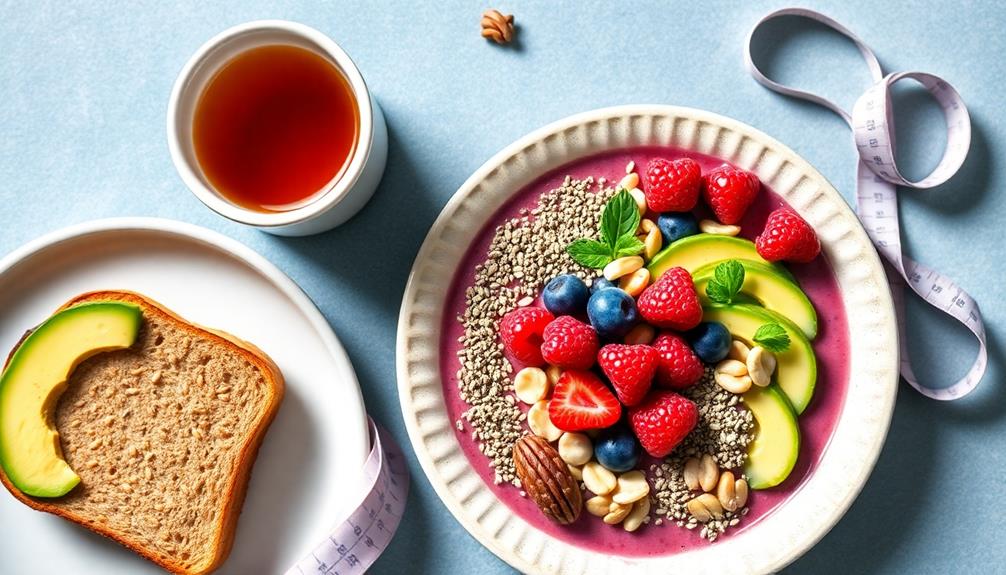
Eating breakfast consistently plays an essential role in weight management and healthier dietary choices. By starting your day with a nutritious meal, you're more likely to stabilize your blood glucose levels and control your appetite throughout the day.
Additionally, incorporating a balance of macronutrients, such as healthy fats, proteins, and limited carbohydrates, can enhance the benefits of your breakfast and align with your dietary goals, especially for those following a keto diet nutrition tracking apps.
Here are some benefits of eating breakfast:
- Lower obesity rates
- Reduced impulsive eating of unhealthy foods
- Increased satiety, leading to less snacking
- Better adherence to fruit and vegetable intake
When you skip breakfast, you could be setting yourself up for weight management struggles. Research shows that individuals who miss this vital meal are five times more likely to experience obesity-related health issues.
Breakfast eaters often report feeling fuller, which decreases the likelihood of reaching for high-energy, high-fat foods later on. Furthermore, those who prioritize a healthy breakfast tend to make better dietary choices throughout the day, contributing to overall improved health.
By ensuring you eat breakfast, you're not just fueling your body; you're also making a proactive choice to support your weight management goals and enhance your dietary habits.
Quick and Easy Breakfast Ideas
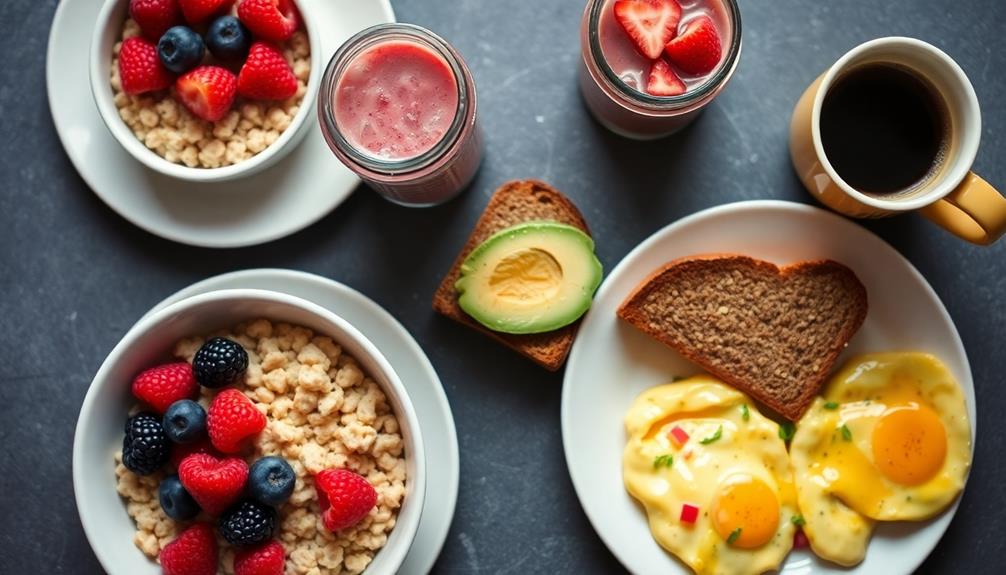
A busy morning often leaves little time for a healthy breakfast, but you don't have to sacrifice nutrition for convenience. There are several quick breakfast ideas that can keep you fueled throughout the day.
Start with oatmeal topped with fresh fruits; it's high in fiber and provides sustained energy while aiding digestive health.
If you prefer something ready to grab, prepare overnight oats with yogurt and berries the night before. This nutritious option is both convenient and delicious.
Whole grain toast or bagels with nut butter are also great for a quick breakfast; they offer a satisfying source of protein and healthy fats that help you feel full longer.
For a revitalizing twist, blend a low-fat protein smoothie with spinach, banana, and almond milk. It's a nutrient-dense option packed with essential vitamins.
Finally, consider creating yogurt parfaits with granola and mixed fruits. This balanced meal is rich in vitamins, minerals, and fiber, making it a perfect healthy breakfast choice.
With these quick breakfast ideas, you can easily jumpstart your day without compromising on nutrition!
Professional Guidance for Healthy Eating
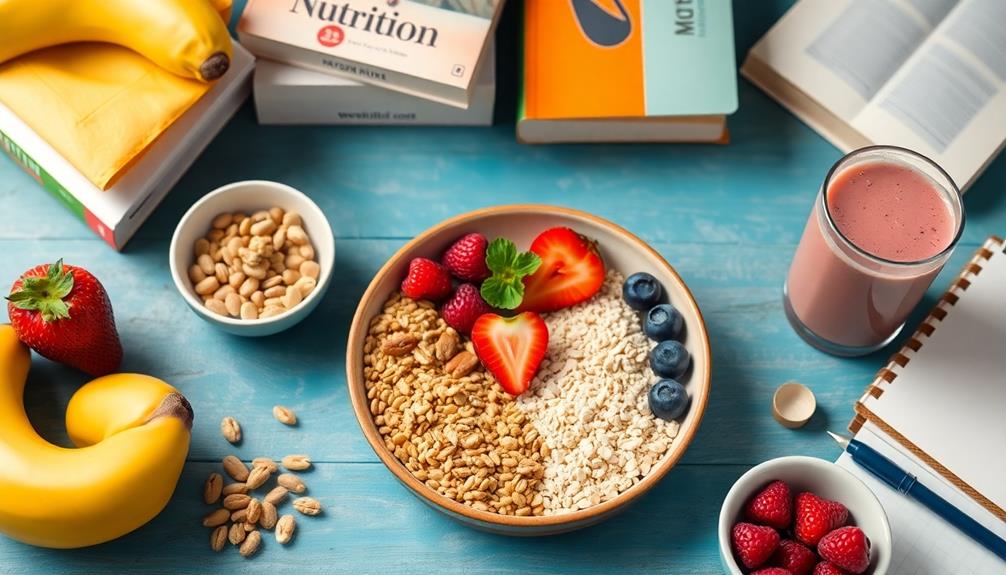
When you seek expert dietary recommendations, you're taking a significant step toward healthier eating.
Personalized meal planning from a registered dietitian can help you meet your specific health goals while enjoying your meals.
Plus, tapping into available nutritional resources can guide you in making informed choices for a balanced breakfast and beyond.
Expert Dietary Recommendations
For anyone looking to improve their morning routine, expert dietary recommendations can provide invaluable guidance. By focusing on your breakfast choices, you can set a positive tone for your entire day. Here are some essential tips to take into account:
- Choose a variety of food groups for ideal nutrition.
- Incorporate whole grains, proteins, healthy fats, and fruits or vegetables.
- Read food labels to avoid added sugars.
- Aim for nutrient-dense options to support heart health.
Health organizations, like the Heart Foundation, emphasize these elements as part of your daily recommended intake. Consulting a registered dietitian can help tailor your breakfast to meet individual health needs and preferences.
These professionals can explain the long-term benefits of regular breakfast consumption, such as improved energy levels and a reduced risk of chronic diseases like obesity and diabetes.
Additionally, utilizing resources from Dietitians Australia and Nutrition Australia can enhance your understanding of healthy eating habits. By engaging with these guidelines, you'll not only improve your breakfast choices but also invest in your overall well-being.
Start your day right and reap the rewards of a nutritious breakfast!
Personalized Meal Planning
Engaging with a registered dietitian can greatly elevate your breakfast game. They provide personalized meal planning that aligns with your unique health goals, dietary restrictions, and lifestyle preferences. This tailored approach guarantees you're making balanced breakfast choices that fuel your day with essential nutrients for energy and cognitive function.
When you share your personal food preferences and limitations, a dietitian can craft dietary strategies that are easier to adopt and maintain. They'll help you overcome common barriers, such as time constraints and morning appetite issues, by suggesting quick and nutritious breakfast options that fit your routine.
Regular check-ins with your dietitian can keep you on track, allowing you to adjust your meal plan as needed and reinforcing the importance of consistent breakfast consumption. This ongoing support is crucial for your overall health and well-being, making it simpler to establish and maintain healthy breakfast habits.
With professional guidance, you'll find that personalized meal planning isn't just about what you eat, but how it contributes to a healthier lifestyle. Embrace this opportunity to transform your mornings and create lasting positive changes in your eating habits.
Nutritional Resources Availability
Accessing nutritional resources is essential for anyone aiming to improve their eating habits.
With the right guidance, you can create a balanced breakfast that meets your health needs and sets a positive tone for the day. This is particularly important as a healthy breakfast can help manage weight and improve metabolic function, much like how common cold medications can effectively relieve symptoms when used appropriately.
Here are some valuable resources to take into account:
- Consult a registered dietitian for personalized meal planning tailored to your specific health needs.
- Explore organizations like Dietitians Australia and Nutrition Australia for extensive dietary guidelines emphasizing the importance of breakfast.
- Utilize the Australian guide to healthy living to understand essential nutrients, including the vitamins and minerals found in breakfast foods.
- Connect with local health services for additional support and educational materials that promote healthy eating habits.
Frequently Asked Questions
Why Is It Important to Have a Healthy Breakfast?
A healthy breakfast kick-starts your metabolism, fuels your brain and body, and helps you meet daily nutrient needs. It stabilizes blood sugar, reduces hunger later, and can even improve your academic and physical performance.
Why Is It Important to Eat Healthy in the Morning?
Why wouldn't you want to fuel your day right? Eating healthy in the morning boosts your energy, sharpens focus, and helps you make better choices, setting a positive tone for the hours ahead.
What Are 5 Benefits of Eating Breakfast?
Eating breakfast boosts your metabolism, enhances cognitive function, helps meet nutrient needs, stabilizes blood sugar levels, and encourages physical activity. These benefits contribute to better overall health and reduce the risk of chronic diseases.
Is Breakfast the Most Important Meal of the Day a Fact?
Is breakfast really the most important meal of the day? While opinions vary, many studies suggest it boosts your focus, energy, and overall health, making it a vital part of your daily routine.
Conclusion
So, you think skipping breakfast is a great way to save time? Ironically, you might be robbing yourself of the energy and focus needed to tackle your day. Embracing a healthy breakfast isn't just about food; it's about fueling your success. By investing a few minutes in a nutritious meal, you'll find that your productivity and mood soar. Who knew that giving up those extra minutes could actually steal your potential? Don't let hunger hold you back!
Recipes and Cooking Tips
What Is the Healthy Breakfast? Simple Tips to Build a Nutritious Morning!
Kickstart your day with nutritious breakfast tips that balance protein, fiber, and hydration—discover how to elevate your morning routine!

A healthy breakfast fuels your day with essential nutrients. To start strong, combine protein-rich options like eggs or Greek yogurt with high-fiber whole grains, like oatmeal or whole grain toast. Don't forget to add fruits or vegetables for extra vitamins and minerals. Hydration is key too; opt for water or herbal tea to jumpstart your metabolism. Avoid processed foods and sugary cereals that spike your blood sugar and leave you craving more. By focusing on balance and variety, you're setting the tone for a nutritious morning. Stick around, and you'll discover even more tips for breakfast success!
Key Takeaways
- Start your day with high-fiber whole grains and lean protein for lasting energy and satiety.
- Incorporate colorful fruits and vegetables for essential vitamins and minerals to enhance cognitive function.
- Avoid processed foods and added sugars to prevent energy crashes and maintain stable blood sugar levels.
- Hydrate with water or herbal tea in the morning to jumpstart metabolism and aid digestion.
- Experiment with simple options like smoothies or overnight oats to gradually incorporate healthy breakfasts into your routine.
Nutritional Benefits of Breakfast
Breakfast is often considered the most important meal of the day, and for good reason. Starting your day with a healthy breakfast kickstarts your metabolism after fasting overnight, enhancing calorie burning and boosting your energy levels.
When you choose a high-fiber breakfast, like oatmeal or whole grain toast, it promotes digestive health and helps you feel fuller throughout the morning. Incorporating protein-rich foods, such as eggs or Greek yogurt, not only supports muscle maintenance but also improves your overall satiety compared to lower-protein options.
For those following a ketogenic diet, a well-rounded breakfast with keto breakfast ideas can provide satisfying and low-carb options. This combination of protein and fiber can keep cravings at bay, making it easier to stick to your health goals. Regular breakfast consumption is linked to a lower risk of weight gain and type 2 diabetes, providing long-term health benefits you won't want to overlook.
Don't forget to add a variety of fruits and vegetables to your morning meal. These nutrient-dense choices offer essential vitamins and minerals that support your overall health and well-being.
Protein-Rich Breakfast Options

A variety of protein-rich breakfast options can set you up for a productive day ahead. Including these choices can help you feel satisfied and energized:
- Eggs: With about 25g of protein per serving, eggs are a nutrient powerhouse, supporting eye and brain health. They're versatile and cook quickly, making them ideal for busy mornings.
- Greek Yogurt: A 150g serving of Greek yogurt offers around 15g of protein and probiotics that enhance gut health. Pair it with fruits for added fiber and flavor to create a well-balanced breakfast.
- Cottage Cheese: This low-fat option provides about 24g of protein per cup, keeping calories around 180. It's filling, making it a great base for toppings like berries or nuts to boost your intake of fiber and protein.
Incorporating these protein-rich breakfast options guarantees you're not only fueling your body but also setting a positive tone for the day.
Consider adding a protein shake into the mix for even more benefits! A healthy breakfast is key to maintaining energy and focus throughout your morning.
Healthy Breakfast Combinations
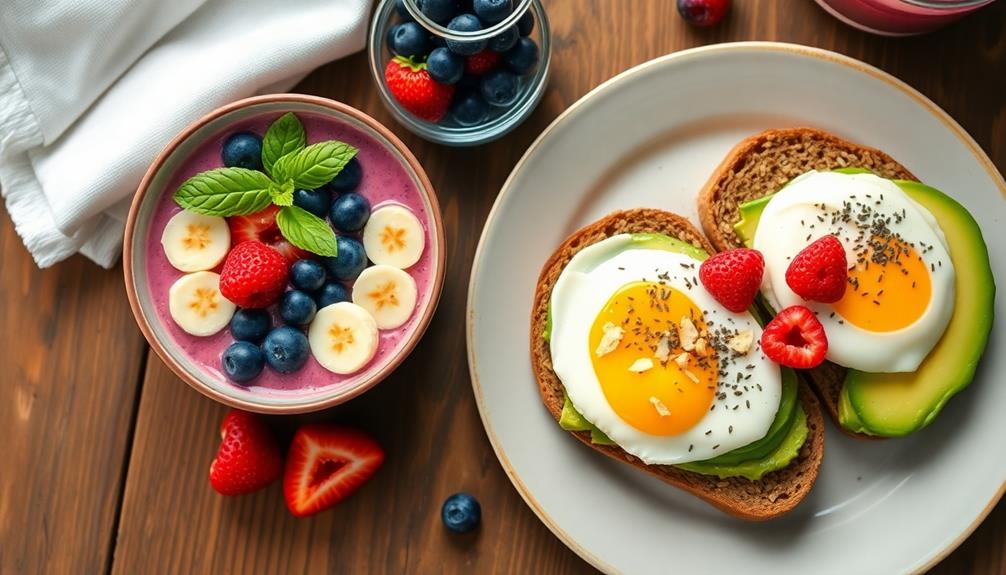
Combining different food groups at breakfast can enhance your nutrient intake and keep you satisfied longer. Consider pairing eggs with whole grain toast and sautéed vegetables, which not only provides a rich source of protein and fiber to kickstart your day but also helps support overall health by reducing the risk of chronic diseases, as highlighted in the importance of balanced nutrition.
Greek yogurt topped with fresh berries and a sprinkle of nuts is another excellent option, as it delivers protein, antioxidants, and healthy fats, promoting satiety and digestive health.
If you're looking for something hearty, try steel-cut oatmeal with sliced apples and a dash of cinnamon. This breakfast is high in fiber and can help lower cholesterol while providing sustained energy.
For a quick and nutritious choice, whip up a smoothie with spinach, banana, and a scoop of protein powder. This option is nutrient-dense, offering vitamins and protein with minimal preparation time.
Don't forget about overnight oats with chia seeds and mixed berries. They not only enhance your fiber intake but also serve as a convenient, ready-to-eat breakfast option for busy mornings.
Importance of a Nutritious Breakfast

Starting your day with a nutritious breakfast can considerably impact your overall health and well-being. It kickstarts your metabolism, promoting calorie burning and boosting your energy levels throughout the day.
Regularly enjoying a nutritious breakfast is associated with a lower risk of weight gain and type 2 diabetes, delivering long-term health benefits.
Here are three key reasons to prioritize a nutritious breakfast:
- Stable Blood Sugar Levels: High-fiber breakfasts improve digestive health and help keep your blood sugar levels steady, reducing the urge for mid-morning snacks.
- Enhanced Satiety: Including protein-rich foods in your morning meal enhances feelings of fullness, leading to healthier eating patterns later in the day.
- Improved Cognitive Function: Eating breakfast within an hour of waking has been shown to improve concentration and cognitive function, supporting better performance in your daily activities.
Hydration and Beverage Choices

Staying hydrated in the morning is vital for your overall health and metabolism.
Opt for healthy drink choices like water, herbal tea, or green tea to kickstart your day without added sugars.
Healthy Drink Options
A variety of healthy drink options can elevate your breakfast experience while keeping you hydrated and energized. Choosing the right beverages not only supports hydration but also enhances your nutrient intake. Here are three excellent options to take into account:
- Water: Drinking water first thing in the morning kickstarts hydration after a night of fasting, boosting your energy levels and cognitive function. Staying hydrated is vital for overall health and can even aid in kidney stone prevention.
- Green Tea: Packed with antioxidants like catechins, green tea can improve metabolism and fat oxidation. It's a great way to enjoy a warm beverage without added sugars or calories.
- Black Coffee: When consumed plain, black coffee offers a low-calorie option that enhances alertness and physical performance. Just skip the creams and sugars to keep it healthy.
Avoid commercial fruit juices loaded with added sugars; instead, opt for whole fruit, which provides essential nutrients and higher fiber content without spiking your blood sugar levels.
With these healthy beverage options, you can start your day on the right foot, ensuring your breakfast is both nourishing and hydrating.
Importance of Hydration
How does proper hydration impact your morning routine? Staying hydrated after overnight fasting is essential for jumpstarting your metabolism and boosting your energy levels.
When you hydrate first thing in the morning, you set the tone for a nutritious morning ahead. Healthy beverage choices like water, green tea, and black coffee can keep you hydrated without the added sugars and empty calories found in many commercial juices.
Drinking a glass of water before breakfast can greatly aid digestion, helping your body process the food you eat more efficiently. Plus, it can prevent overeating later in the day, keeping your energy stable.
You might also consider herbal teas, which not only hydrate you but also offer additional health benefits, including antioxidants and anti-inflammatory properties.
Avoid juices with added sugars; they can lead to excessive calorie intake and don't provide the benefits of whole fruits. By making smart beverage choices, you pave the way for a healthier lifestyle.
Foods to Avoid for Breakfast
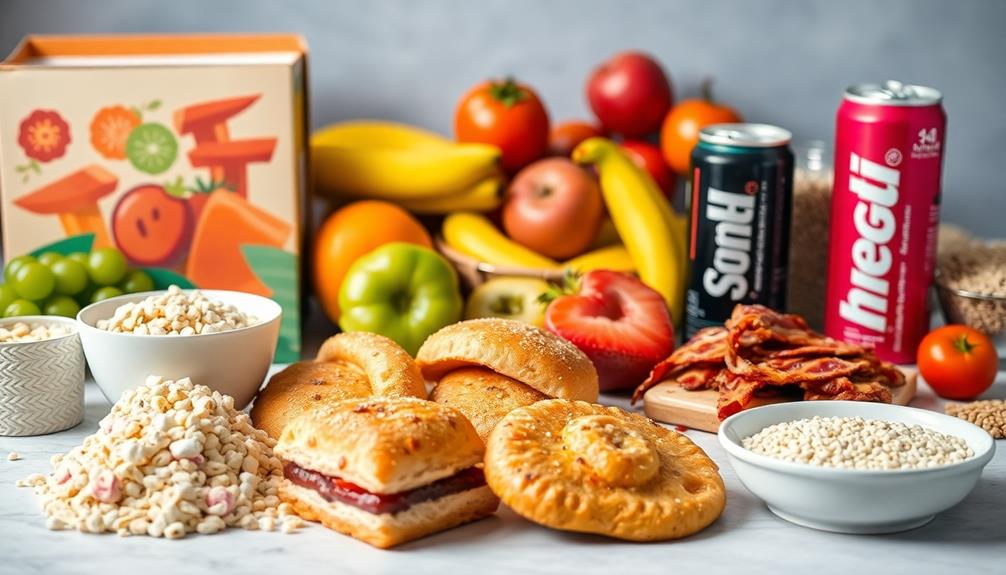
When it comes to breakfast, skipping certain foods can make a significant difference in your overall health. Here are three types of foods you should avoid:
- Processed foods: Items like pastries and sugary cereals may be tempting, but they're often high in calories and low in essential nutrients. This can leave you feeling hungry again shortly after eating.
- Products with added sugars: Flavored yogurts and breakfast bars often contain excessive added sugars, leading to insulin spikes. This can increase your risk for long-term health issues, including heart disease and diabetes.
- Refined flour: Foods made with refined flour, such as white bread and certain breakfast pastries, can cause rapid spikes in blood sugar levels. This not only results in energy crashes but can also lead to cravings later in the day.
Instead, consider incorporating whole fruit and healthier breakfast recipes that avoid unhealthy fats.
Practical Tips for Breakfast Success
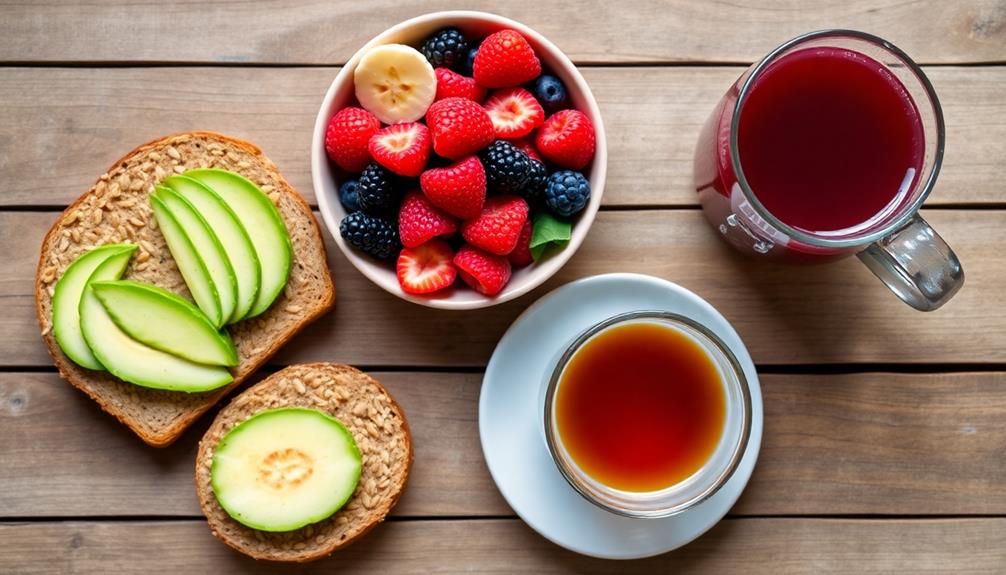
Making healthier choices for breakfast can set you up for a successful day. Start by aiming for a balanced morning meal that includes high-fiber whole grains, lean protein, and colorful fruits or vegetables. You might want to make overnight oats or batch-cooked muffins to guarantee you have quick, nutritious breakfast foods ready to go. This meal prep strategy saves you time on busy mornings.
If you're someone who skips breakfast, try gradually increasing your breakfast frequency. Begin with simple options like smoothies or yogurt parfaits, allowing your body to adjust to a consistent routine.
Don't hesitate to experiment with portion sizes and combinations to find what works best for you. This personal touch can improve your overall satisfaction with healthy breakfast choices.
Lastly, don't forget to stay hydrated! Pair your breakfast with water, herbal tea, or black coffee while avoiding sugary drinks. Keeping your hydration levels up will support your energy levels and metabolic function throughout the day.
Frequently Asked Questions
What Is the Easiest Healthiest Breakfast?
The easiest healthiest breakfast includes options like Greek yogurt, overnight oats, smoothies, or whole grain toast with avocado. These choices are quick to prepare, nutritious, and customizable, keeping you satisfied and energized throughout your morning.
What Is the Healthiest Thing to Eat First Thing in the Morning?
Did you know that eating a nutritious breakfast can boost your concentration by up to 20%? You should start your day with whole grains, fresh fruit, or Greek yogurt for sustained energy and better overall health.
What Is the Best Healthy Breakfast in the Morning?
When you're choosing the best healthy breakfast, focus on protein-rich foods like eggs or Greek yogurt, add fiber from whole grains, and include fruits or vegetables for essential nutrients and sustained energy throughout your morning.
What Is the First Thing You Should Eat in the Morning for Gut Health?
To boost your gut health in the morning, start with fiber-rich oatmeal or chia seeds. Add Greek yogurt for probiotics, whole fruits for fiber, and healthy fats like avocado to promote digestion and overall wellness.
Conclusion
Starting your day with a nutritious breakfast is like fueling a car with high-quality gasoline—it keeps you running smoothly and efficiently. By incorporating protein-rich foods, healthy combinations, and proper hydration, you set yourself up for success. Remember to avoid sugary cereals and processed options that can derail your energy levels. With these simple tips, you can create a breakfast routine that nourishes your body and mind, making each morning a step towards better health.
Recipes and Cooking Tips
How to Make Delicious and Healthy Breakfast: Recipes for Every Day!
Jumpstart your mornings with delicious and healthy breakfast recipes that will leave you craving more—discover the perfect meal to start your day!

To make delicious and healthy breakfasts, start by including whole grains, fruits, and proteins. Try overnight oats topped with your favorite fruits, or whip up protein-packed egg muffins filled with veggies. Smoothies are another great option; blend Greek yogurt, spinach, and fruits for a quick nutrient boost. Don't forget versatile breakfast bowls, which can combine grains and proteins with your choice of toppings. You can even make flavorful pancakes using natural sweeteners. With so many easy recipes available, you'll have a different tasty breakfast every day. Keep exploring these options to find more exciting meals to kickstart your mornings!
Key Takeaways
- Start your day with balanced meals that include whole grains, fruits, and proteins to fuel your body and mind.
- Try nutritious oat recipes like overnight oats or savory oatmeal for a filling breakfast option.
- Incorporate protein-packed egg dishes like scrambled eggs or veggie omelets for a quick and customizable meal.
- Blend refreshing breakfast smoothies using Greek yogurt, frozen fruits, and leafy greens for quick nutrition.
- Experiment with versatile breakfast bowls and quick breads to prepare ahead and enjoy throughout the week.
Importance of a Healthy Breakfast
When it comes to starting your day right, a healthy breakfast is essential for fueling your body and mind. Eating a nutritious morning meal kickstarts your metabolism, helping to burn calories throughout the day and maintain your energy levels.
Easy Keto Breakfast Ideas show that incorporating healthy options can make breakfast both delicious and satisfying. Studies show that having a balanced breakfast can considerably improve your concentration and cognitive function, boosting your performance at school or work.
Regularly consuming healthy breakfasts is vital for weight management, as it helps regulate hunger and reduces the likelihood of overeating later. It's a simple yet effective way to lower your risk of obesity. Incorporating whole grains, fruits, and proteins into your breakfast can provide essential vitamins and minerals that contribute to your overall health and well-being.
Moreover, research indicates that skipping breakfast is linked to an increased risk of cardiovascular diseases. So, don't underestimate the power of a wholesome morning meal!
With a little meal prep, you can enjoy delicious breakfasts every day that nourish your body and set a positive tone for the rest of your day. Prioritize a healthy breakfast, and you'll reap the benefits all day long.
Nutritious Breakfast Oat Recipes
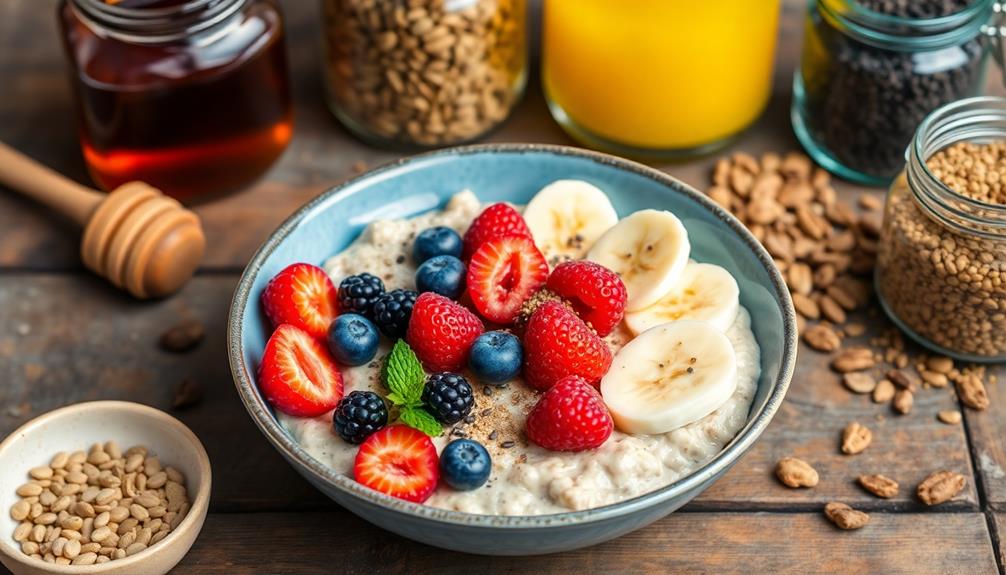
Starting your morning with a bowl of nutritious oats can set a positive tone for your day. Packed with fiber, oats promote digestive health and keep you feeling full.
For those following a ketogenic diet, you can also explore keto breakfast options that include egg-based dishes, which are high in protein and low in carbohydrates.
Here are four delicious and healthy breakfast oat recipes you can try:
- Overnight Oats: Prepare them the night before by mixing rolled oats with your choice of milk or yogurt. Top with fruits, nuts, or a dollop of nut butter for added nutrition.
- Savory Oatmeal: Swap sweet toppings for savory ones! Mix in avocado, poached eggs, and a sprinkle of salt for a protein-rich twist.
- Baked Oatmeal: This make-ahead option allows you to bake a large batch, perfect for serving multiple people. Add spices like cinnamon or vanilla for extra flavor.
- Fruit and Nut Oatmeal: Cook your oats and stir in your favorite dried fruits and nuts. This hearty option makes for a filling and nutritious breakfast.
These oatmeal recipes aren't only simple but also versatile, ensuring you can enjoy a healthy breakfast every day!
Protein-Packed Egg Dishes

When you're looking for quick egg breakfast ideas, protein-packed dishes like omelets and frittatas are perfect.
Not only do they offer significant nutritional benefits, but they're also highly customizable, allowing you to tailor flavors and ingredients to your liking.
Let's explore how you can whip up delicious, protein-rich meals that keep you energized throughout the day.
Quick Egg Breakfast Ideas
If you're looking for quick egg breakfast ideas that are both delicious and nutritious, you're in the right place. Eggs are high in protein, making them perfect for busy mornings.
Here are four quick options to kickstart your day:
- Egg Muffins: Whip up a batch of egg muffins filled with your favorite veggies. These make-ahead breakfast gems are perfect for grabbing on the go and each muffin packs around 7 grams of protein.
- Scrambled Eggs with Spinach: In under 10 minutes, you can have scrambled eggs that aren't only fluffy but also packed with veggies like spinach for added nutrients.
- Breakfast Burritos: Fill a whole wheat tortilla with scrambled eggs and black beans for a balanced meal. This combination keeps you full with protein and fiber.
- Veggie Omelet: Toss in bell peppers, mushrooms, or any veggies you love. This quick dish is high in protein and takes just minutes to prepare.
These quick egg breakfast ideas are sure to keep you energized and satisfied throughout your busy mornings!
Nutritional Benefits of Eggs
Many people mightn't realize just how nutritious eggs are, especially when it comes to protein-packed dishes. Each large egg provides about 6 grams of high-quality protein, which supports muscle health and repair. This makes eggs a fantastic choice for your breakfast recipes, helping you start the day strong.
In addition to protein, eggs are loaded with essential nutrients like vitamin B12, riboflavin, and selenium, all of which contribute to energy metabolism and immune function. Curiously, juice diets may not provide the same level of protein, making eggs a superior option for a balanced breakfast. At only around 70 calories per egg, they're a low-calorie, nutrient-dense food option that can aid in weight management.
Eggs also contain choline, crucial for brain health and development, with one egg offering about 147 mg of this nutrient. Plus, the healthy fats found in eggs, especially omega-3 fatty acids in enriched varieties, can promote heart health and reduce inflammation.
Incorporating eggs into your breakfast not only boosts your protein intake but also provides a wealth of nutrients that support overall health. So, whether scrambled, poached, or in an omelet, don't underestimate the benefits of eggs in your morning routine!
Customizable Egg Recipes
Start your day off right with customizable egg recipes that pack a protein punch! Eggs are high in protein, giving you about 6 grams per large egg, ideal for keeping your energy levels up.
Plus, you can easily incorporate vegetables for added nutrition, flavor, and a healthy balance.
Here are some delicious options to contemplate:
- Omelets: Whip up an omelet loaded with spinach, bell peppers, and tomatoes. You'll love the burst of flavors!
- Frittatas: Bake a frittata with your favorite veggies and herbs. It's a great way to use leftovers.
- Egg Muffins: Prepare egg muffins ahead of time, freeze the leftovers, and simply reheat for a quick breakfast in just 2 minutes.
- Scrambled Eggs: Mix in lower-fat cheese or fresh herbs to elevate scrambled eggs while keeping them nutritious.
With their versatility, you can poach, scramble, or bake your eggs to match your taste.
Customizable egg recipes not only fuel your day but also help you maintain a healthy and satisfying breakfast routine!
Refreshing Breakfast Smoothies

If you're looking for a quick and nutritious breakfast, breakfast smoothies are the way to go. You can easily pack them with nutrient-dense ingredients like spinach, fruits, and Greek yogurt for a healthy boost.
Additionally, incorporating elements that support overall well-being, such as natural remedies, can enhance your smoothie experience.
Plus, with a few preparation tips, you can whip up these delicious blends in no time, making busy mornings a breeze.
Nutrient-Dense Ingredients
Kickstart your day with a rejuvenating breakfast smoothie that's loaded with nutrient-dense ingredients.
These smoothies aren't only delicious but also packed with essential nutrients to fuel your morning. Incorporating essential oils can also enhance your smoothie experience; for instance, a drop of peppermint oil can provide a revitalizing twist and may help with digestion and nausea essential oils for digestion.
Here are four key ingredients to contemplate:
- Greek Yogurt – A fantastic source of protein, Greek yogurt contains about 10 grams per serving, helping you feel fuller and supporting muscle health.
- Frozen Fruits – Incorporating frozen fruits like bananas and berries adds natural sweetness and a dose of antioxidants, making your smoothie a nutritional powerhouse.
- Leafy Greens – Spinach is a low-calorie addition that provides vitamins A and C, iron, and fiber, enhancing the nutritional profile of your smoothie without overpowering the flavor.
- Superfoods – Chia seeds or flaxseeds are excellent choices for adding omega-3 fatty acids and extra fiber, promoting both digestive health and heart wellness.
Quick Preparation Tips
A revitalizing breakfast smoothie can be whipped up in no time with a few quick preparation tips.
First, prepare your smoothie ingredients in advance by portioning fruits, vegetables, and any add-ins into freezer bags. This makes it easy to blend a nutritious drink in the morning. Using frozen fruits not only creates a thicker texture but also keeps your smoothie cold without needing ice, which can dilute the flavor.
For a delicious dish that keeps you energized, incorporate protein sources like Greek yogurt, nut butter, or protein powder. This enhances satiety and boosts nutritional value.
Don't forget to blend in some leafy greens like spinach or kale; they're nearly tasteless when combined with fruits and can greatly elevate vitamins and minerals without altering the flavor.
Versatile Breakfast Bowls
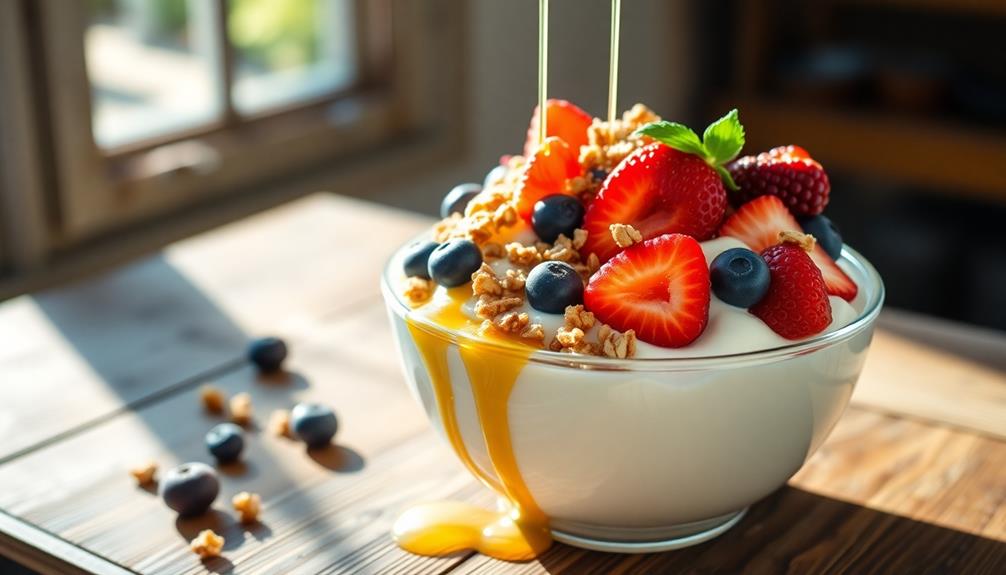
When you're looking for a quick yet nutritious breakfast option, versatile breakfast bowls are a fantastic choice. They allow you to mix and match ingredients, making it easy to cater to your taste and dietary needs.
Here are four ideas to inspire your breakfast bowl creations:
- Base: Start with grains like quinoa, rice, or farro.
- Proteins: Add eggs, Greek yogurt, or nuts to boost nutrition and keep you full longer.
- Toppings: Top your bowl with fruits, seeds, or nut butters to enhance flavor and add healthy fats.
- Customize: Feel free to tailor the ingredients to fit your diet, whether that's vegan, gluten-free, or high in protein.
Preparing components in advance can save you time in the morning. Cook your grains and chop your favorite fruits and proteins ahead of time, so assembling your breakfast bowl becomes a breeze.
This way, you'll always have a delicious and healthy meal ready to go, making breakfast something you can enjoy every day. Embrace the versatility of breakfast bowls and make your mornings both satisfying and energizing!
Easy Quick Bread Options

Quick breads like banana bread, zucchini bread, and pumpkin bread offer a delicious and convenient way to enjoy breakfast on the go.
These moist treats can be whipped up in under an hour, making them perfect for busy mornings. You can easily make a big batch and store them in the freezer for quick access to nutritious breakfasts throughout the week.
To amp up the nutritional benefits, consider incorporating ingredients like Greek yogurt or applesauce.
These additions not only enhance moisture but also keep the calorie count in check. You can customize your quick breads with various add-ins like nuts, seeds, or dried fruits to boost fiber and protein content, making your breakfast even more satisfying.
Many quick bread recipes are versatile enough to allow for whole grain flours, which support heart health and provide a sustained energy release.
With these easy quick bread options, you'll always have a healthy breakfast on hand.
Flavorful Pancakes and Waffles

Indulging in flavorful pancakes and waffles can turn your breakfast routine into a delightful experience. By using whole-grain flours, you not only increase fiber content but also add a nutty flavor that makes each bite enjoyable.
Here are some tips to elevate your pancake and waffle game:
- Use mashed bananas or applesauce in your batter for natural sweetness and moisture, reducing the need for added sugars.
- Incorporate chia or flaxseeds to boost omega-3 fatty acids and enhance the nutritional profile of your pancakes and waffles.
- Top with Greek yogurt, fresh fruits, and nuts to transform a simple meal into a balanced powerhouse of protein, vitamins, and healthy fats.
- Consider freezing waffles after cooking them in batches; you'll have quick, nutritious breakfast options ready to reheat on busy mornings without sacrificing taste.
Customizable Breakfast Tacos

Customizable breakfast tacos offer a delicious way to kickstart your day. Start with a base of scrambled eggs, packed with protein and essential nutrients.
The great thing about these tacos is their versatility; you can add ingredients like spinach and avocado for a boost of healthy fats and vitamins.
Use whole-wheat tortillas or corn tortillas as your fiber-rich wrapper, promoting digestive health while keeping your meal wholesome.
The beauty of customizable breakfast tacos lies in their ability to cater to your taste preferences. Whether you love savory flavors or a spicy kick, you can mix and match to create the perfect taco for you.
To make your mornings even easier, consider prepping a batch ahead of time. You can scramble a large quantity of eggs, portion out your toppings, and store everything in the fridge or freezer.
When morning comes, simply warm up your tortillas, fill them with your prepared ingredients, and enjoy a nutritious meal in minutes.
Customizable breakfast tacos not only satisfy your hunger but also support a healthy lifestyle, making them an ideal breakfast choice!
Healthy Grab-and-Go Snacks

Healthy grab-and-go snacks are essential for busy mornings when you need a nutritious boost without the hassle. Preparing these snacks in advance can save time and guarantee you stay energized throughout the day.
Here are four easy options:
- Homemade Energy Balls: Mix oats, nut butter, and honey for a quick, no-bake snack that's packed with protein and healthy fats.
- Greek Yogurt Parfaits: Layer Greek yogurt with your favorite fruits and granola. This high-protein treat is also rich in probiotics, benefiting your digestive health.
- Muffins: Bake whole grain muffins, like banana or zucchini, in advance. You can freeze them for a portable breakfast option that's both delicious and nutritious.
- Smoothie Packs: Prepare smoothie packs filled with fruits and greens. Store them in the freezer and blend in the morning for a quick, nutrient-dense breakfast on the go.
Frequently Asked Questions
What Is the Healthiest Breakfast to Eat Every Day?
The healthiest breakfast you can eat daily includes a balance of protein, whole grains, fruits, and healthy fats. Think eggs with whole-grain toast, berries, and avocado for sustained energy and improved focus throughout your day.
What Should My Daily Breakfast Be?
Your daily breakfast should be a colorful tapestry of nutrition. Think protein-packed eggs, creamy avocado, and hearty whole grains. Add vibrant fruits or veggies for a health boost, ensuring you feel energized and satisfied throughout the morning.
What Are 10 Healthy Breakfast Foods?
For a healthy breakfast, consider oats, eggs, Greek yogurt, berries, whole grains, nuts, seeds, avocados, smoothies, and cottage cheese. Each option boosts energy, supports digestion, and keeps you satisfied throughout your busy morning.
What Is the Healthiest Breakfast Combination?
Picture a sunrise on your plate: pairing Greek yogurt with vibrant berries and crunchy nuts creates a harmony of flavors. Add whole grains and protein, and you've crafted the healthiest breakfast combination for lasting energy.
Conclusion
So, there you have it! With these scrumptious breakfast ideas, you'll transform your mornings into a culinary adventure that rivals the finest brunch spots! Picture yourself diving into a mountain of fluffy pancakes, sipping on a smoothie that dances with vibrant colors, and enjoying a breakfast taco bursting with flavors that could make taste buds do cartwheels! Embrace these delicious, healthy options, and start each day feeling like a superstar ready to conquer the world!
-

 Restaurant and Fast Food Breakfast3 months ago
Restaurant and Fast Food Breakfast3 months agoHardee's Breakfast Hours Revealed – Don’t Miss Out!
-

 Cultural and Regional Breakfasts3 months ago
Cultural and Regional Breakfasts3 months agoClassic American Breakfasts That Will Make Your Morning!
-

 Local Breakfast Spots3 months ago
Local Breakfast Spots3 months agoBest Breakfast Spots in Las Vegas You Have to Try!
-

 Catering and Delivery3 months ago
Catering and Delivery3 months agoBreakfast Delivery Options That Will Blow Your Mind!
-

 Recipes and Cooking Tips3 months ago
Recipes and Cooking Tips3 months agoThe Ultimate Breakfast Casserole With Biscuits Recipe!
-

 Cultural and Regional Breakfasts2 months ago
Cultural and Regional Breakfasts2 months agoTaiwanese Breakfast Dishes You Have to Try!
-

 Health and Nutrition3 months ago
Health and Nutrition3 months agoHigh-Calorie Breakfasts for Those Who Need the Boost!
-

 Local Breakfast Spots3 months ago
Local Breakfast Spots3 months agoScarlet Lady: Where to Eat Breakfast in 2024!
